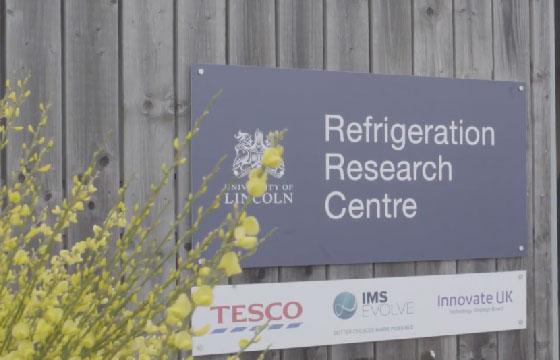
New research has shown that the UK’s network of commercial refrigeration systems could operate as one large nationwide battery to help reduce carbon emissions and alleviate the strain on the National Grid.
New research has shown that the UK’s network of commercial refrigeration systems could operate as a single, large nationwide battery to help reduce carbon emissions and alleviate the strain on the National Grid. With refrigeration in supermarkets consuming a significant amount of the UK’s electricity, the research shows how the hundreds of thousands of commercial refrigeration systems across the UK could be leveraged using the Internet of Things (IoT) to act as a national energy buffer with power absorbed or released when needed.
Funded by Innovate UK in collaboration with the University of Lincoln, IMS Evolve, Tesco Stores Ltd, and The Grimsby Institute, the research has been conducted at the world’s first Refrigeration Research Centre (RRC) in Riseholme, Lincoln, where researchers and engineers have modelled the essential dynamics of a typical 2000 sqft supermarket store.
The increasing use of wind and solar power in the grid comes with the challenge that renewables are unpredictable. The RRC research proves that the electricity buffer offered by connected fridges and freezers could provide an alternative and more sustainable solution for short-term energy storage and frequency regulation than fossil-fuelled alternatives. The electricity buffer would help stabilise the grid through frequency regulation, whilst safeguarding quality and safety of refrigerated produce.
Simon Pearson, Director of the Lincoln Institute for Agri-food Technology (LIAT) at the University of Lincoln, explained, “Maintaining a reliable and efficient network of commercial refrigeration systems is absolutely imperative, as supermarkets use them not only to keep our food and drink chilled but also to prolong the shelf life of produce. Currently, control systems use very static control temperatures, but this project is developing algorithms to dynamically control refrigeration temperatures.”
Published in a major academic journal, Applied Energy, the research paper outlines how demand response algorithms developed using IMS Evolve’s IoT technology can dynamically control refrigeration temperatures and enable power to be used more intelligently.
Edward Porter, Director of IoT, IMS Evolve, said. “This research has established how the nations retail fridges and freezers could be used through smart technology to cut CO2, stabilize the grid and reduce costs while ensuring the quality of the refrigerated products. At a time when the demand pressures on the National Grid are increasing rapidly, this a critical breakthrough.”
The UK grid is to be hit in the next decade by the double impact of the mass adoption of Electric Vehicles alongside a steep increase in demand to power datacentres and devices. The nine million EVs expected on the roads by 2030 will need the equivalent of three new power stations to keep charged, but at the same time, the data sector requirements are expected to grow to 20 percent of grid power. Meeting these new demands and developing more intelligent ways for the National Grid to use electricity has been the focus of the research, which can be read in full on Applied Energy:
https://www.sciencedirect.com/science/article/pii/S0306261919310311